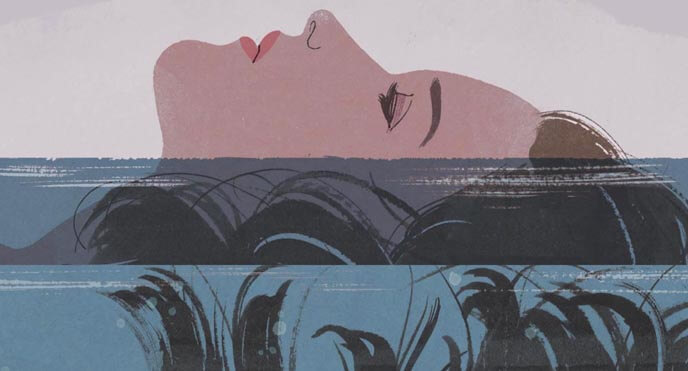“Everyone’s a Little Unlikable”: An Interview with Catherine Lacey, Author of NOBODY IS EVER MISSING


This summer marked the release of Catherine Lacey’s debut novel Nobody Is Ever Missing, and one of the things we couldn’t help but think as we hastened our way through its pages (well, “hastened” before doubling and even tripling back and re-reading some of the most lyrical prose we’ve happened upon in a while), was that summer is the perfect time for this tale of loss and reflection. Is there any season more desperate than summer? Any time of year when an acute pang of regret pervades everything we do and see and feel? No. There isn’t. And so this summer was the perfect time to enter the world of Lacey’s Elyria, a world which resembled our own, but also felt like it might be, as Lacey told me, “one degree off.”
In Nobody Is Ever Missing, Lacey—who has written for Brooklyn Magazine in the past—relates the journey of 28-year-old Elyria, who has left her husband and embarked on a journey to New Zealand, ostensibly to search out a man she met once at a party, but really just because she needs to keep moving. And, of course, because no man is really a destination—or even much of an escape—Elyria’s journey is much less about what she’s doing externally, and more about what she’s exploring internally. She seems to vibrate with the specific type of loss that is all too familiar to anyone who has had someone close to them die or has had a relationship ruined or who has just been a person—especially a woman—who thinks and thinks and thinks, even if it would be better to just stop thinking once in a while, and to rest.
We spoke with Lacey about the book, about Elyria, and about the difficulties specific with being a woman writing about a woman very close in age to herself.
A lot of readers assume that writers—especially debut, female novelists—re writing about themselves. And you and Elyria have a shared experience—hitchhiking through New Zealand—and are about the same age. And so is it safe to assume you’ve had a lot of questions about whether or not Elyria is based on you and your own experiences? And do you think that those questions happen more because you’re a woman?
When I first started working on the book, it was way more about my experience. I did spend three months there in New Zealand. But my experience was not that much about what happens in the book, though I was hitchhiking around and feeling lonely. My character encounters a whole new set of problems.
That kind of question gets asked to everybody, but there’s a quote that the writer Fiona Duncan sent to me, a quote from Jeanette Winterson in a forward to a Kathy Acker book, in which she says, “I have noticed that when women writers put themselves into their fiction, it’s called autobiography. When men do it, such as Paul Auster or Milan Kundera it’s called meta-fiction.”
That’s a distinction that I’ve seen from the point of view of the reader a lot, where if you write an insane character and you’re a woman, the author is conflated with that kind of hysteria, but it doesn’t happen as much with men. Sometimes with men too, to qualify that, but not as much.
It seems to happen with men like Philip Roth, Martin Amis, John Updike… but it doesn’t seem to be done with the same negative cast as there is with women authors.
On those higher levels, though, like Philip Roth already has his thing, because we do conflate him with all his characters; but we kind of dismiss it. But with younger authors, I think young men are given more space than young women. I don’t really know what happens when you get up to 20th book zone like with Roth. I’m not there yet.
In terms of not having the kind of space that young men are given, have you found that you’ve been treated in a very gender specific way while promoting the book?
There was a male host that was interviewing me for a morning TV show, where, before we started taping, he asked, “So how about that New York Times review?” And [the review in question] was a really nice, respectful, thoughtful review written by an older man critic. And I said, “Yeah, it was great!” And the host followed up by asking, “Did he have a crush on you or something?”
That is so infuriating!
I didn’t even get a chance to respond to him. This host is not a critic; he’d barely read the book. But he was the one who picked my book because he’d read the review, and so it was like what the fuck? He’d never say that to a man! So little things like that. It’s no different than just being a young woman and doing anything. But it winds up feeling so much worse because I’ve invested so much time, and it almost feels like harassment in the workplace.
And it diminishes your accomplishments and reduces who you are to just what you look like.
Attractiveness is used as an insult at that level. Like if you did something that you just do with your brain, it’s like you’re not allowed to do that. I feel like with every woman I know, you’re aware of it at a young age, but the older you get the more you’re just like, “This is bogus!” It’s like you get reminded of it all the time, that you’re a woman. Even when it’s a gentle way, you can never escape it.
It takes a lot of strength to be able to overcome that kind of bias, a lot of purpose. Purpose is something Elyria doesn’t really have all that much of. She’s recognizable and relatable in so many ways, but she doesn’t have that focus that you sort of need to survive and thrive.
[In creating Elyria, it became about] taking somebody who’s just like anybody else, except she just can’t take care of herself. She’s like a lot of my friends, but she’s just one degree off, like she’s missing one little link on the self-awareness or self-preservation scale. I didn’t think of her as being super-depressed or anything. She kind of is, I guess, but I didn’t think of her that way. She’s like anyone, but she’s just missing something.
She is “off,” but I never felt like she was really in danger. Or at least not like the danger was coming from herself. Like I don’t think she’s suicidal.
She’s not.
But there is something missing.
She’s missing the ability to turn things off. Everyone thinks of terrible things all the time, but she can’t turn it off.
I thought of it as sort of being dystopic, the way everything was so amplified with Elyria. I felt like the exaggeration of that one quality, the inability to turn things off, could affect everything else around her.
It’s that type of relentlessness that winds up feeling oppressive, but there’s also something freeing about it, like, here’s a person who can go all the way, who doesn’t pull herself back.
I think people that are attracted to that kind of extreme way of living are better off. If you’re willing to go to that kind of emotional extreme, knowing you can come back, there’s something about it that’s better for you, I think. The main criticism of the book that I’ve heard from people is that it’s too sad. It’s true that she’s really sad and hard to be around sometimes, and I felt really emotionally drained at the end of the day when I was writing. But I want to read something that pushes me out to a place that I don’t want to necessarily go on my own. But I think some people don’t want to go there. They don’t want to have that screaming break-up, they want everything to be normal. But those people are the craziest.
They are! And they’re also usually the ones who have some cop-out reason for not dismissing a book, like that the character’s “unlikable.”
Everyone’s a little unlikable! If we had a real stream of what people were thinking, nobody would pass that test. So first-person narrators, if they’re going to be full, they’re going to be complicated. And maybe there’s parts of them that you’re not going to want to be around all the time, but that’s ok.
Follow Kristin Iversen on twitter @kmiversen
You might also like 




















